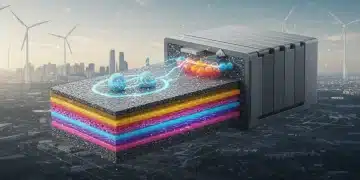Next-gen battery storage solutions are revolutionizing energy

Next-gen battery storage solutions enhance energy efficiency, sustainability, and performance, but they face challenges including high costs, resource availability, and safety concerns that need to be addressed for broader adoption.
Next-gen battery storage solutions are paving the way for a more sustainable future. Have you ever wondered how these innovations can impact our daily lives? Let’s dive into what makes them so essential.
Understanding next-gen battery technology
Understanding next-gen battery technology is crucial as we move towards a more sustainable energy future. These innovative batteries can store energy more efficiently and safely than ever before.
Key Features of Next-gen Batteries
Next-gen battery systems come equipped with features that enhance their performance and usability. Some of the notable characteristics include:
- Higher energy density: This means they can store more energy in a smaller space.
- Improved lifespan: Many advanced batteries can last significantly longer, reducing waste.
- Rapid charging: These batteries can charge much faster, making them convenient for everyday use.
- Enhanced safety: New materials and designs reduce the risk of overheating and failure.
As we explore these systems further, it becomes clear that they can power everything from electric vehicles to renewable energy installations. The shift towards next-gen battery solutions is not just about technical advancements; it’s also about addressing the growing demand for energy storage in a sustainable manner.
Emerging Technologies
Recent breakthroughs in battery chemistry are changing the landscape dramatically. For instance, solid-state batteries are gaining attention for their potential to replace liquid electrolytes with solid materials, enhancing safety and efficiency. Another exciting area of research involves lithium-sulfur batteries, which promise much higher capacity compared to traditional lithium-ion batteries.
This technology not only revolutionizes our approach to energy storage but also makes renewable energy sources like solar and wind more viable on a larger scale. Imagine a world where energy can be stored more efficiently and accessed easily when needed.
As interest in next-gen battery technologies grows, companies and researchers collaborate to expand their applications, making them suitable for homes, industries, and beyond. The future of energy storage is bright, thanks to these innovations.
Benefits of next-gen battery storage solutions

The benefits of next-gen battery storage solutions are transforming the energy landscape. These advancements promise not only better performance but also a cleaner, more sustainable future.
Key Advantages
One of the most significant advantages is that these batteries can store large amounts of energy. They help in balancing supply and demand, especially with renewable sources like solar and wind. Other notable benefits include:
- Cost-effectiveness: Over time, the use of advanced battery storage reduces energy costs.
- Enhanced efficiency: New technologies allow for increased charging and discharging rates.
- Longer lifespan: Many next-gen batteries are designed to last longer than traditional options, leading to less waste.
- Environmental impact: These batteries often use sustainable materials, making them more eco-friendly.
Adopting next-gen battery storage solutions can also improve grid stability. As more homes and businesses integrate these systems, they become less reliant on fossil fuels. This transition not only supports individual energy needs but also promotes a healthier planet.
Real-World Applications
From electric vehicles to home energy storage, the applications of these solutions are vast. For example, homeowners can store energy from their solar panels and use it during peak hours, reducing their bills and dependence on the grid. Moreover, industries can rely on battery storage for backup power, ensuring operations continue smoothly even when outages occur.
The growing adoption of next-gen battery solutions is crucial for cities aiming to integrate renewable energy into their infrastructure. With increased efficiency and reduced costs, these systems are paving the way for communities to thrive sustainably.
Applications of advanced battery systems
Applications of advanced battery systems continue to expand across various industries, making them an essential part of modern technology. These innovative solutions are paving the way for increased efficiency and sustainability.
Electric Vehicles
One of the most recognized applications is in electric vehicles (EVs). Next-gen batteries power these cars, providing long-range capabilities and quick charging options. Improved performance allows for more accessible entry into electric transportation, which reduces reliance on fossil fuels. As a result, the automotive industry is undergoing a significant transformation.
Renewable Energy Storage
Another vital application is energy storage for renewable sources like solar and wind. By using advanced battery systems, excess energy generated during peak times can be stored and used when production is low. This capability enhances grid reliability, leading to a more stable energy environment.
- Solar energy systems: Homeowners can store solar energy generated during the day for use at night.
- Wind farms: Batteries can hold excess power from wind turbines to supply energy when demand peaks.
- Smart grids: Incorporating battery storage into smart grids helps balance supply and demand effectively.
Furthermore, these systems play a significant role in power backup solutions. Businesses and households can ensure continuous power supply during outages easily. This reliability is crucial for critical services like hospitals and data centers, where interruptions can have severe consequences.
Consumer Electronics
In consumer electronics, advanced battery systems are also making waves. Devices like smartphones, laptops, and tablets benefit from longer-lasting and faster-charging batteries. Manufacturers continuously innovate to deliver better performance, allowing users to enjoy seamless experiences without interruptions.
As technology evolves, we can expect to see even broader applications of advanced battery systems. From personal gadgets to large-scale energy solutions, their importance in our daily lives will only increase.
Challenges in implementing new battery solutions

While the promise of new battery solutions is exciting, there are several challenges in their implementation that must be addressed. These obstacles can impact the widespread adoption of advanced battery technologies.
High Costs
One significant challenge is the initial costs associated with these technologies. Advanced materials and manufacturing techniques can lead to higher production costs, making these batteries less affordable for consumers and businesses. As a result, achieving competitive pricing with traditional energy sources remains a challenge.
Resource Availability
The production of next-gen batteries often relies on rare materials, which can create supply chain issues. For example, lithium and cobalt are essential components for many batteries, yet mining these resources can be environmentally damaging and socially contentious. Finding sustainable alternatives is crucial to overcome this hurdle.
- Environmental concerns: Mining activities can lead to habitat destruction and pollution.
- Supply chain disparities: Limited access to essential materials can hinder battery production.
- Ethical sourcing: Ensuring that materials are sourced responsibly is essential for credibility.
In addition, the manufacturing processes for these advanced batteries can be complex and require significant energy. This complexity can lead to longer production times and delays in getting these technologies to market. As industries adapt, finding more efficient and scalable production methods becomes critical.
Technological Limitations
Although progress is being made, many next-gen battery technologies are still in their infancy. Issues related to battery performance, such as efficiency and lifespan, need to be further explored and improved. For users to embrace these solutions fully, they must deliver performance that meets or exceeds current standards.
Another concern is battery safety. Previous battery technologies have faced incidents related to overheating and fires. Ensuring that new batteries are safe for everyday use is vital for building public trust and encouraging adoption.
Facing these challenges head-on will be essential for advancing new battery solutions and making them a viable option for consumers and industries alike. As technology evolves, collaboration between manufacturers, researchers, and policymakers will play a crucial role in overcoming these obstacles.
next-gen battery storage solutions offer significant benefits, including increased efficiency, sustainable energy use, and improved performance across various sectors. However, challenges like high costs, resource availability, and technological limitations must be addressed to realize their full potential. As research continues and innovations emerge, the future of battery technology looks promising, with the possibility of revolutionizing how we store and use energy. Collaborative efforts will be key to overcoming obstacles and ensuring a sustainable and efficient energy landscape.
FAQ – Frequently Asked Questions about Next-Gen Battery Storage Solutions
What are next-gen battery storage solutions?
Next-gen battery storage solutions refer to advanced battery technologies that store energy more efficiently and sustainably, enhancing energy management.
What are the benefits of using advanced battery systems?
They provide increased efficiency, longer lifespan, lower environmental impact, and better performance in applications like electric vehicles and renewable energy storage.
What challenges are associated with implementing new battery technologies?
Challenges include high costs, resource availability, technological limitations, and ensuring safety during use.
How do advanced battery systems impact renewable energy use?
They store excess energy generated by renewable sources, making energy more reliable and promoting a sustainable energy landscape.





